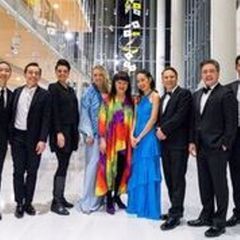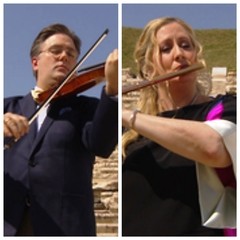|
Back
Orpheus Triuphant New York
Bruno Walter Auditorium
09/04/2019 - & September 6, 2019
Ludwig van Beethoven: Serenade for Flute, Violin and Viola, Opus 25
Johann Sebastian Bach: Andante from Solo Violin Sonata
Claude Debussy: Syrinx
George Tsontakis: Knicknacks for Violin and Viola
Maurice Ravel: Five Popular Greek Songs
Felix Mendelssohn, Octet, Opus 20
Emily d’Angelo (mezzo), Tara Helen O’Connor (Flute), Sean Lee, Danbi Um, Aaron Boyd, Arnaud Sussman (Violins), Matthew Lipman, Paul Neubauer (Violas), Dmitri Atapine, David Finckel (Cello), Wu Han (Pianist)
Wu Han and David Finckel (Producers for Chamber Music Society of Lincoln Center)

CMSLC Artist Group at Stavros Niarchos Foundation Cultural Center (© Da-Hong Seetoo)
“Euclid alone has looked on Beauty bare.”
Edna St Vincent Millay (1892-1950)
“If a man knew the way to Larissa, would he not be a good guide? And a person who had the right opinion as to which was the way to Larissa, but had never been there and did not really know, might also be a good guide, might he not?”
Socrates (??-399 B.C), through Plato’s Mena discussing the origin of knowledge.
The sterling musicians of the Lincoln Center Chamber Music Society played Greece last summer. The musicians won.
A documentary film showed their travels through this, the ultimate outlier in Europe, a land of desolate flatness and glorious mountains, the Periclean democracy which lived on slaves, had endless warfare and executed Socrates for not being religious enough, the land which let her own treasures die while under the talons of the Ottoman Empire, whose Zorba-like joyousness, whose superb poets like Cavafy are set against a bankrupt economy...
Well, all that was papered over by the New York artists who visited Greece, and whose trip became a documentary to be shown this week on the Public Broadcasting System.
In one way, this 90-minute film is an intimate picture of musicians reveling in their work. Not much offstage (or of-ttemple or off-church). Yet in the 30-minute sequence of the Mendelssohn Octet, the camera saw them at their most personable. They were smiling, egging each other on, they ripped through the elfin Scherzo, and we saw fingers and hands and–what we don’t see in the concert hall–eyes darting, near laughter, seriousness and cueing from one to the other.
Yes, the audio was hardly first class (much blurring in Mendelssohn’s most diaphanous work), but the volition, energy and character of the players on the bare stage of an Athens concert hall (courtesy of the late Stavros Niachos billions) was victorious.
Twice–and this was essential–the camera pulled away to show a few Greek scenes which had nothing to do with the music. A market, a port...Yet the music was all.

A. Boyd/T. H. O’Connor at Larissa Ancient Theater
(© “Live From Lincoln Center”)
This was almost the same in the jovial Beethoven Serenade for Violin, Viola and Flute, in a 18th Century Byzantine church. Let’s face it: for all its incense, its 13th Century architecture, its mystical history, these churches are heavy, stolid, gloomy buildings. Quite the opposite of fiddler, Aaron Boyd, flautist (flutist?) Tara Helen O’Connor and violist Paul Neubauer, having more fun with Beethoven than they should be allowed. But Lud wouldn’t have minded. This was a lighthearted work, the ultimate “music of friends”.
Yet, without a single cutout from those dusty icons and banners, one wanted something more exciting, more curious.
So after awhile, one forgot about Greece and concentrated on the artists. On Aaron Boyd playing a long Andante from a Bach Sonata, this in the Temple of Larissa, so famed 2,500 years ago that Socrates used it as a landmark. The playing was splendid, the camera flew around the temple.
Three of the pieces actually had an alliance with Greece. Ms. O’Connor played Debussy’s Syrinx in a temple with the mountains behind her. On a mere concert hall, Ravel’s Greek Popular Songs were given a splendid performance by mezzo Emily d’Angelo, with Wu Han, co-producer of the Chamber Music Society and moderator of the session with her incomparable Vivace con spirito energy, on piano.
The third was a commission by Greek-American George Tsontakis, a short violin-viola duet called Knicknacks. Bartók never quite essayed Greek music, but his Romanian dances could have overlayed this delightful dance work.
This was the music. One couldn’t get enough of it. But Greece? Yes, a few picture-postcard shots of mountains and temples, the amphitheater where the soloists played, and a several comments about Greek perfectly classical symmetry.
True, the photography was crystal clear. Yet how could it not be? Marc Chagall, after his first visit to Greece, said that he had never seen light this way, he had never experienced color like Greek color, he had never seen the sky before he saw the sky of Greece.
Little was apparent here. But then, American director Habit Azar was not making an art film here. He was making a documentary about music, with a few glittering, vivid backgrounds.
That Second Century Greek travel-writer Pausanias might have despaired at opportunities lost. That ageless musician Orpheus would have delighted in the strings, voices, piano and flute.
In the words of Aeschylus, “When men are eager and enthusiastic, the gods will always join in.”
CODA: Odyssey: The Chamber Music Society in Greece, will air on PBS Friday, September 6, 2019. This, the first production outside of America, is also the first production American artist at the Stavros Niarchos Foundation Cultural Center.
CODA TWO: Those looking for more Greek premiers will find them in Carnegie Hall on October 10, when the Athens Philharmonic will play–wait for it–Mahler’s “Resurrection” Symphony.
Harry Rolnick
|